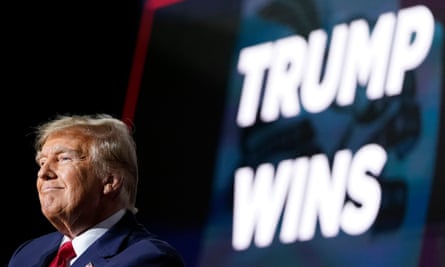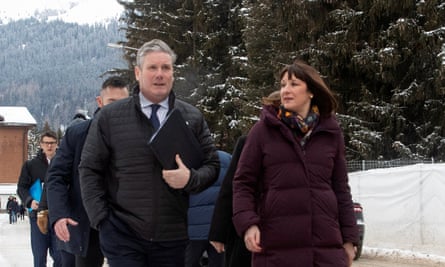Vladimir Putin and Donald Trump. Neither were on the guest list for the 54th annual meeting of the World Economic Forum, yet the man in the Kremlin and the other one plotting a return to the White House still managed to dominate Davos.
The regular January talkfest high in the Swiss Alps attracted an impressive list of world leaders of all political persuasions. The Chinese premier, Li Qiang, set out China’s five-point plan for rebuilding trust. Javier Milei used his first overseas trip since becoming Argentina’s president to set out his ultra free-market agenda. The French president, Emmanuel Macron, boasted about his success in revitalising France’s economy.
Yet in a week dominated by the war in Ukraine, Putin was everyone’s favourite villain. The Russian president once gave a keynote addressat Davos, but that was 15 years ago, before the 2014 annexation of Crimea and the 2022 invasion of Ukraine. These days Putin is most definitely persona non grata.

Neither – judging by the mood at the forum – would Trump be welcomed back with open arms should he become US president for a second time this November. Trump’s agenda – end the war in Ukraine within 24 hours, put the US first and retreat from globalisation – runs counter to the Davos orthodoxy.
The week began with news that Republicans in the key state of Iowa had chosen Trump to be their candidate to be president, and the scale of his victory reverberated around the conference hall. Politicians and the heads of multilateral institutions were all bombarded with the same question: what will another Trump presidency mean for the world? Privately, many chief executives were thinking about another question: what will a Trump presidency mean for my company’s share price?

The leading Kremlin critic Bill Browder said the possibility of a Trump presidency should spur western governments into seizing Russian central bank reserves so that they could be used to fund the reconstruction of Ukraine.
“Confiscating the $350bn [£276bn] is Donald Trump insurance. It needs to be done before the US election, so that if that were to come to pass, Ukraine can carry on defending itself and win,” Browder said.
Browder, the chief executive of Hermitage Capital, was speaking on the fringes of the forum, having baulked at paying the $250,000 entrance fee. He was not alone in seeing Davos as a giant money-making event.
Other politicians were also noticeable by their absence. Rishi Sunak would have enjoyed rubbing shoulders with the tech entrepreneurs waxing lyrical about the benefits of artificial intelligence, but being in Davos with the global elite is not deemed a good look for Britain’s wealthiest-ever prime minister. Even if that were not the case, Sunak would have been kept at home by the government’s difficulties in getting its Rwanda bill through parliament.

With his chancellor, Jeremy Hunt, arriving in the early hours of Thursday by private jet, after being delayed by the Rwanda vote, his Labour counterpart, Rachel Reeves, swept into the vacuum to lead a charm offensive.
Accompanied by the shadow business secretary, Jonathan Reynolds, she sought to portray her party as a government in waiting, telling chief executives at a breakfast that Labour wanted to work with business to increase investment. They later hobnobbed with global executives at a party hosted by JP Morgan’s Jamie Dimon and the former prime minister Tony Blair.
With Labour roughly 20 points ahead in the opinion polls, and the Tories riven by infighting, it was a message that resonated with bosses. “They were very organised and strategic in systematically using Davos to meet global businesses and sending the message that we are open for business, which is a positive for the UK,” said one.
They added: “If you are in business you know you are not going to get a wild lurch in either direction. “She [Reeves] sounded like a Tory chancellor. She realises their only option is to aggressively pursue supply-side reform that can boost growth that can give them that fiscal flexibility.”

Another said he was quietly impressed. Reeves and the Labour leader, Keir Starmer, and Reeves “really listen”, said the executive.” “She has relevant experience. They are the closest thing I’ve seen to that Blair-Brown combination.”
In reality, Reeves and Reynolds said little that was new. The shadow chancellor’s message was one of reassurance: Labour has ditched the radical economic strategy of Jeremy Corbyn and will concentrate on measures, such as planning changes, to increase the supply side of the economy. “We intend to build a more secure economy,” Reeves said during one panel event, “but it can’t just be about spending money. We don’t have that luxury.”
David Cameron, Britain’s newly installed foreign secretary, was left to fly the flag solo for the government until Hunt’s arrival. The former Tory prime minister drew a direct comparison between the efforts to fight Putin and fascism. “This is the struggle of our generation. It is like being a foreign minister in the 1930s. If you appease aggression you get more of it,” Cameron said. He urged western governments that had frozen the reserves of Russia’s central bank to seize them so that they could be used to rebuild Ukraine’s economy
Poland’s foreign minister, Radek Sikorski, sent a warning to those calling for Ukraine to cede occupied territory to Putin in order to secure a peace deal.“There is never a shortage of pocket [Neville] Chamberlains willing to sacrifice other people’s land for their own peace of mind,” Sikorski said.
after newsletter promotion

Ukraine’s president, Volodymyr Zelenskiy, turned up with one prime objective: to revive flagging western military and economic support for his country. With the conflict about to enter a third year, Kyiv is concerned that war fatigue is setting in, and that the focus of attention has shifted to the Middle East since the Hamas attack on Israel in early October.
“You can’t freeze the conflict,” Zelenskiy said. “Putin is a predator who is not satisfied by frozen products. We have to defend ourselves. We can beat him on the ground, in the air and at sea – and we have proved it.”
He added: “Putin must regret it [the war]. We need him to lose. Global unity is stronger than one man’s hatred. If anybody thinks this is just about Ukraine they are fundamentally mistaken.”
The subtext to Zelenskiy’s appearance was that time could be running out to raise fresh funds, with the prospect of another Trump White House looming. This highlighted a fresh concern: the prospect of AI colliding with the 5 November US election and being weaponised to sow disinformation was at the front of world leaders’ minds.
Unlike Trump and Putin, the burgeoning AI sector was very much in evidence in Davos.
Along the ski resort’s main promenade, where boutiques and restaurants were temporarily converted into popup corporate showrooms, the nascent industry was everywhere.
Marc Benioff, the chief executive of the business IT company Salesforce, said there was a risk AI could go horribly wrong unless it was used responsibly. “Look at what’s happened to social media in the last 10 years. It has been ashitshow. We don’t want that in the AI industry.
“It could go really wrong. We must make sure people don’t get hurt. We don’t want an AI Hiroshima moment. We must make sure we get our head around this now.”
On the same panel, the man synonymous with the rapid growth of generative AI through his company Open AI, said it was a good thing people were worried about the technology. We have our own nervousness, Sam Altman admitted.

Kristalina Georgieva, the head of the International Monetary Fund, said governments needed to “wake up” to the risks of AI and disinformation. With the US election on the horizon, the risks of disinformation were “significant and potentially very severe” and a “big driver of mistrust”, she said.
But for all that concern, Hunt said the UK welcomed AI and its tech evangelist pioneers. He appeared on stage in the cavernous main hall of the congress centre to call for a “light touch” approach to regulating AI. “The choice we need to make is how to harness it, so it is a force for good,” he said.
Hunt may not be chancellor by the time of the Davos summit in a year’s time. Elections in countries containing more than 40% of the world’s population will be held in 2024. The mood at the next World Economic Forum will depend on what happens in the one in early November in the US.







